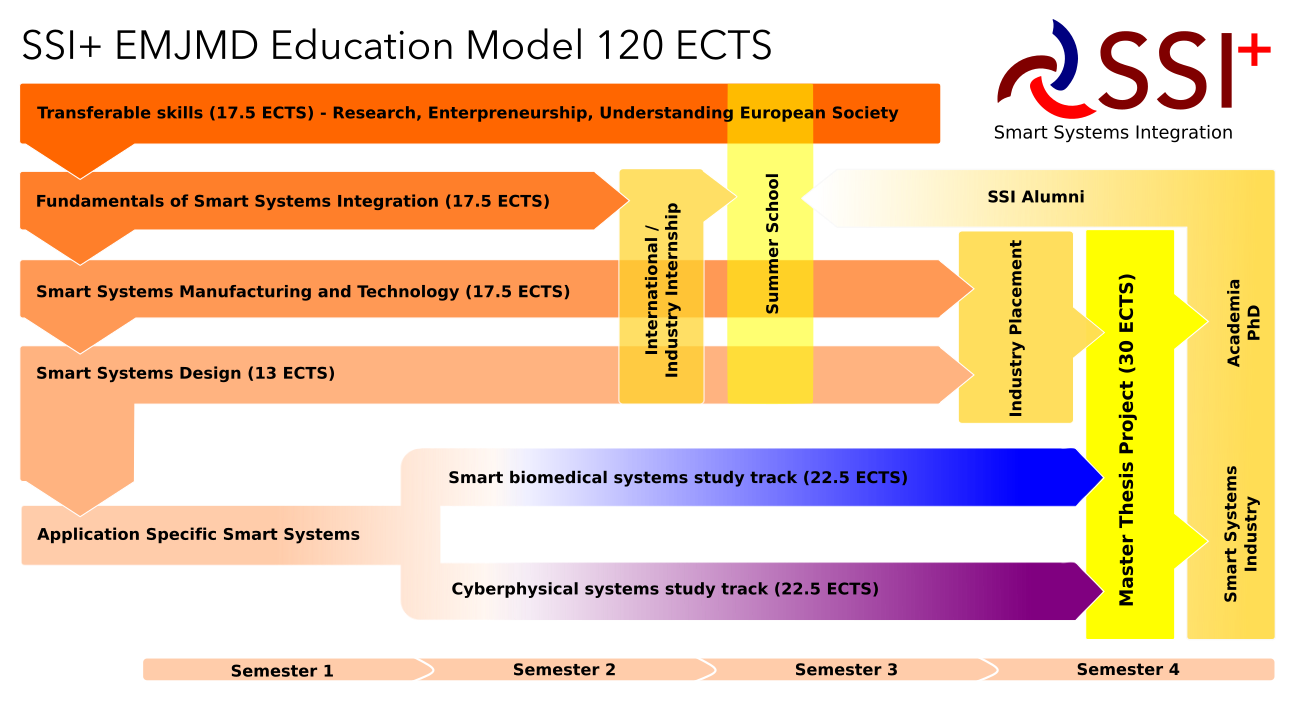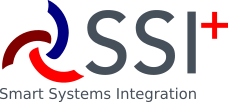
Overview of Study Programme
The 120 ECTS SSI+ MSc Programme is studied over four semesters, the students will spend one semester at each of the three universities, taking full advantage of the recognised expertise, the research and educational facilities of each university. The MSc programme will provide state-of-the-art applied knowledge in the field of Smart Systems design and manufacturing, as well as gaining transferable skills such as advanced writing, research preparation and entrepreneurship.
The first semester in Scotland, is dedicated to the fundamental knowledge and training in Smart Systems Integration.
In the second semester in Norway, the students study manufacturing methods and characterisation techniques for smart systems.
The third semester, in Hungary, focuses on MEMS modelling, analogue and digital hardware design for Smart Systems.
The fourth semester is devoted to the Master Thesis
Study tracks – From the second semester the students have the option of selecting a course toward to specialisation in one of two directions in Smart Systems Integration.
Industrial placement – The SSI+ Programme is supported by industry, giving the students opportunities to gain industrial experience and commercial awareness, and to apply the multidisciplinary knowledge acquired during the semesters.

Transferable Skills: research preparation, readiness for entrepreneurship and understanding European Society. Those skills represent the 15% of the ECTS credits and are fairly equally distributed between the three semesters.
| Transferable Skills | 17.5 ECTS | |
|---|---|---|
| Advanced Writing Skills, Research preparation and Entrepreneurship | 5 ECTS | Sem. 1 |
| Introduction to Scottish Society | 2.5 ECTS | Sem. 1 |
| Norwegian Society, Language and Culture | 5 ECTS | Sem. 2 |
| Introduction to Hungarian Language and Culture | 5 ECTS | Sem. 3 |
Fundamentals and skills related to manufacturing and technology are mainly taught in the first two semesters and represent about 30% of the ECTS credits.
| Fundamentals and skills related to manufacturing and technology | 34 ECTS | |
|---|---|---|
| Fundamentals of Smart Systems Integration | 7.5 ECTS | Sem. 1 |
| Measurements and Characterization | 10 ECTS | Sem. 2 |
| Advanced Packaging and Integration | 7.5 ECTS | Sem. 1 |
| Manufacturing Processes for Smart Systems | 5 ECTS | Sem. 2 |
| Testing, Validation and Virtual Instrumentation | 4 ECTS | Sem. 3 |
Students can choose between two study tracks in the second semester based on two fundamental Smart Systems Application area: Cyberphysical Systems (e.g. autonomous vehicles, smart sensors) or Smart Biomedical Systems (Lab-on-a-Chip devices, health monitors).
The subject of Micro and Nano Biological Systems, being the other elective subject, is one of the speciality research fields of HSN/IMS, particularly through bio-MEMS and applications of smart systems for biological and biomedical systems. In the third semester, the students are arranged into groups and work together the design of a complete Integrated Smart System. The topic of this project is related to the chosen study track.
| Smart Systems Applications | 25.5 ECTS | |
|---|---|---|
| Sensors, Actuators and IoT | 7.5 ECTS | Sem. 1 |
| Microsystem Design1 | 10 ECTS | Sem. 2 |
| Intelligent Sensor Devices Project1 | 8 ECTS | Sem. 3 |
| Micro and Nano Biological Systems2 | 10 ECTS | Sem. 2 |
| Smart Biomedical Devices Project2 | 8 ECTS | Sem. 3 |
The Summer School prior the third semester is an exceptional opportunity for current and graduated (Alumni) students to meet and getting to know each other’s work and also provides feedback for the programme.
The third semester is dedicated to improve Design Skills through special courses in a chosen field of application area. Design and Application skills represent the 25% of the total ECTS credits.
| Smart Systems Design | 14 ECTS | |
|---|---|---|
| MEMS and IC co-design | 4 ECTS | Sem. 3 |
| System Level Design | 4 ECTS | Sem. 3 |
| Individual Project Laboratory | 5 ECTS | Sem. 3 |
The third semester ends with an Industrial Placement where the already achieved knowledge, skills and competences can be utilized in industrial environment.
The Master Thesis project in the last semester represents 25% of the total ECTS value.
